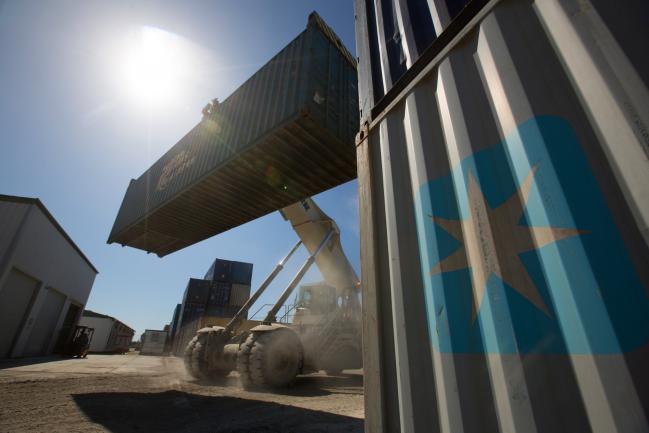(Bloomberg) -- Want the lowdown on European markets? In your inbox before the open, every day. Sign up here.
Shares in the world’s biggest shipping company slumped on Friday after its chief executive officer started discussing the fallout of global trade tensions on his industry.
A.P. Moller-Maersk A/S fell almost 5% in Copenhagen trading, as CEO Soren Skou told analysts and reporters that 2019 will be the year of the trade war.
Maersk, which transports about a fifth of the world’s manufactured goods by sea, is struggling to cope with the threat that escalating trade tensions pose to its business. Skou, who arrived in the Danish capital from China on Friday morning to present first-quarter results, says that volumes on trans-Pacific trade between Asia and North America have already shown signs of decline.
Maersk estimates that global container trade grew just 1.7% in the first quarter from a year earlier. That compares with 3.6% for all of 2018.
Skou says that even if Trump reaches a deal with China, there’s no reason to believe that the global economy will be free of serious trade tensions.
Global Tensions
“It won’t be the end of the trade war,” Skou said. “Then we’ll just see the U.S. turning its attention toward Europe, where there is an unresolved issue with German automakers and other things.”
That means that 2019 “will be the year of the trade war, no matter what happens between the U.S. and China,” he said.
At the same time, Skou said it’s important to distinguish between real data and the content of a tweet sent by U.S. President Donald Trump.
“Something may seem very dangerous the first time it’s tweeted but then you find out: perhaps not,’’ Skou said. “We have realized that it’s not just what the president tweets that matters.”
“There are also consumers that purchase goods every day and their world view is more closely linked to how much money they have to spend and if they have a job, and not so much a question of whether the goods cost a tiny bit more or less,’’ Skou said.
“There are many people analyzing what’s going on,” he said. “We now also have three-quarters of a year worth of experience in what happens in such an environment.”
Real Data
The Maersk CEO also provided details of how businesses on the ground are reacting to the tariffs.
“What is happening at the moment is that U.S. importers are touring China and trying to pressure their suppliers to lower prices, so they eat their share of the tariffs,” Skou said. “On top of that, there’s some help from a depreciation in the Chinese currency. And then there are a lot of efforts to find similar products to import from other countries in Asia: like Vietnam, Indonesia, Cambodia.”
“And then finally, prices will have to go up a bit in the U.S., if this continues,” Skou said. “That may hurt demand. But if the U.S. economy continues to be strong and unemployment stays very low, then the impact will be relatively limited.”
What Bloomberg Intelligence Says
"Escalating trade war puts container shippers at greatest risk. Volume growth faces severe slowdown in 2019 as rising trade tension coupled with Asia’s weak exports to the U.S. on top of stuttering European growth drive down demand. Our forecast of 1-2% container demand growth at best, is a result of tepid European volume expansion and rapidly deteriorating U.S. demand, the sole bright spot in 2018."-- Rahul Kapoor and Chris Muckensturm, transportation analystsClick here to view the research
Maersk said on Friday that it had a good start to the year but warned that “considerable uncertainties” stemming from global trade tensions will probably hurt its business. New tariffs can potentially reduce expected growth in global container volumes by up to 1 percentage point, the company estimates.
Maersk, which also unveiled plans to buy back $1.5 billion in shares over a 15-month period, said it is sticking with its guidance for the full year despite “weaker macro numbers as well as the risk from trade tensions.” The company cited tougher fuel requirements designed to protect the environment as an additional challenge.
Friday’s report was Maersk’s first as a pure transport company, after it ended its conglomerate structure earlier this year. It’s using some of the proceeds from the sale of its oil exploration activities to finance the share buyback program. Maersk also said it will introduce a new dividend policy, with an annual payout ratio of 30%-50% of underlying net profit.
The company’s net interest-bearing debt fell to $12.6 billion at the end of the quarter from $15 billion three months earlier, helped by cash proceeds from the sale of shares in Total that it received in exchange for its oil activities.
Maersk said it may distribute more proceeds to shareholders after the $1.5 billion buyback is completed, but only if doing so doesn’t jeopardize its investment grade rating. It has a BBB grade at S&P and a Baa3 at Moody’s.
Get More
- See Maersk’s 1Q statement here
- Read the Bloomberg Intelligence 1Q preview here
